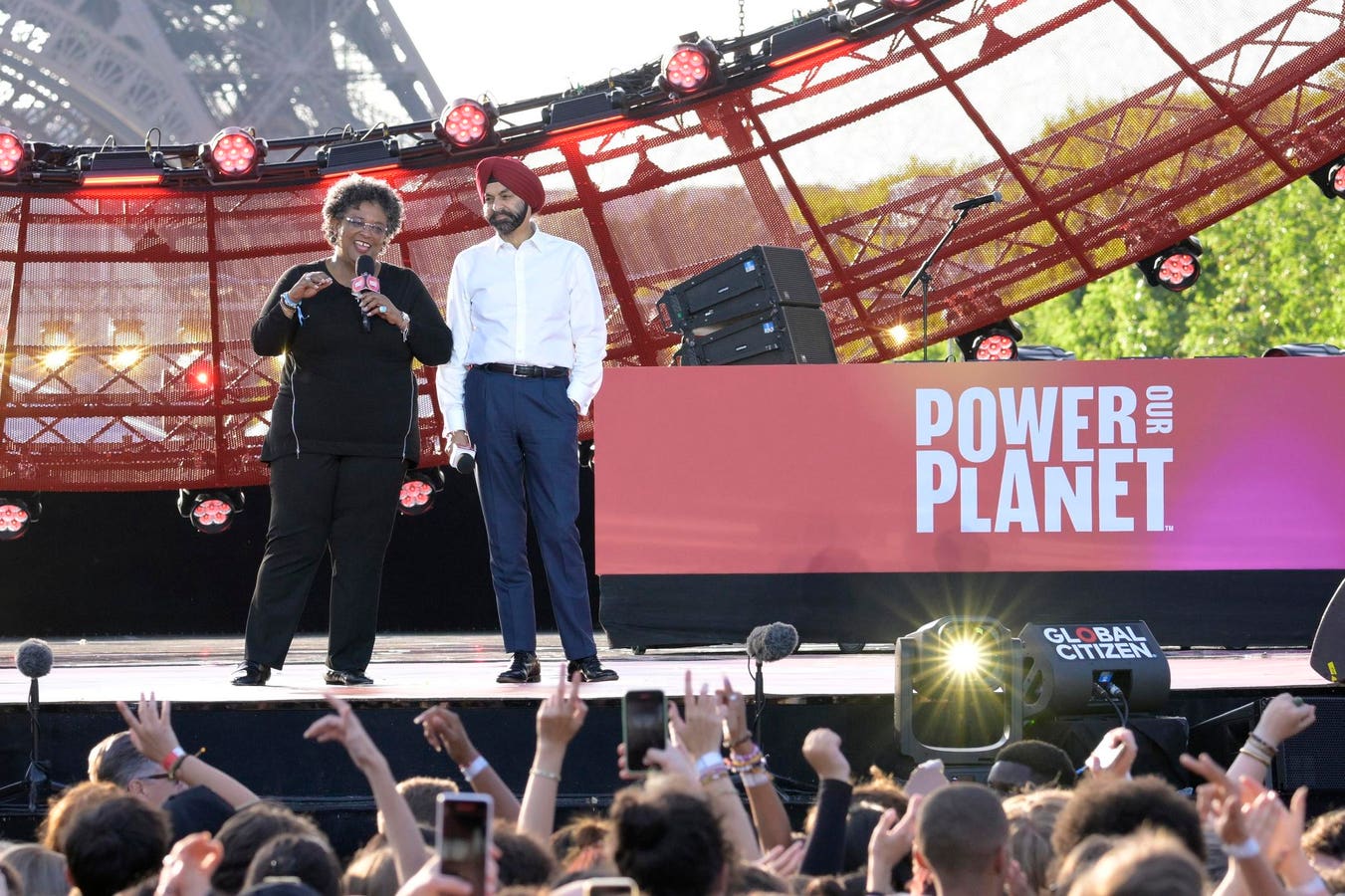Last week’s Summit for a New Global Financing Pact, hosted in Paris by President Emmanuel Macron, highlighted notable moments when leadership was bold and strong, and others when it was sorely lacking. As Heads of State and ministers from the Global North and Global South grappled with the inequities in the global financial system, their goal was to empower developing countries to invest in clean energy and fortify their resilience against natural disasters. While some leaders shone brightly, it was evident that others, notably those representing the US, fell short of the world’s expectations.
The summit had mixed policy outcomes, as is often the case with such convenings. However, there were positive developments worth highlighting. New World Bank President Ajay Banga’s efforts to reform policies, such as the inclusion of debt suspension clauses in loan agreements for disaster-stricken countries, are commendable. There was also a significant breakthrough regarding Zambia’s $6.3 billion debt, although concerns remain about the details, especially regarding clawback clauses. The emergence of support for introducing a tax on the shipping sector, coupled with the openness of certain countries to explore alternative taxation approaches in order to generate more revenue and advance decarbonization initiatives, presents a potentially encouraging prospect. Finally, it is worth highlighting France’s noteworthy commitment to increase its allocation of Special Drawing Rights (SDRs) – an IMF reserve asset primarily issued to affluent economies – to vulnerable countries, aiming to reach a significant 40 percent reallocation.
Despite these positive steps, and President Macron’s best efforts , the Summit for the New Global Financial Pact cannot be considered a success. The lack of ambition from Chancellor Scholz and the absence of action from other G7 leaders demonstrates a continued disregard for the urgent needs of vulnerable nations. Even worse, the US — the largest economy globally — has once again failed to provide a clear explanation of how it intends to fulfill its 2009 commitment to provide financial assistance for climate change adaptation, nor how they plan to deliver on their promise to transfer $21 billion in SDRs. The outstanding amount was not addressed during the summit, and no timeline or plan was communicated. Overall, in the absence of any additional proposals, US Treasury Secretary Janet Yellen’s discussion of the need for reform appeared empty and insensitive to the current situation.
On the other hand, there were several notable highlights from the summit worth mentioning:
1/ From Challenge to Success: Natural Disaster Clauses Normalized in the Global Financial Landscape
Less than a year ago, Prime Minister Mia Mottley spearheaded the Bridgetown Initiative in Barbados, introducing comprehensive reforms to tackle global financial issues. One key aspect championed by Mottley was the inclusion of Natural Disaster debt clauses, allowing countries to pause their debt repayments in the event of shocks like natural disasters or pandemics. Mottley began championing these clauses long before the Bridgetown Initiative existed, and the outcome of the summit has brought about significant progress. Five multi-development banks have agreed to incorporate these clauses into their loan agreements, for instance, and several large economies have committed to do the same. When speaking to the Prime Minister and her advisors, their satisfaction was evident. This is a remarkable win considering the concept was initially seen as an impossible challenge to the system. To see it now become normalized is truly remarkable.
To illustrate the potential efficacy of debt suspension clauses, Barbados is potentially poised to release a significant sum of up to U.S. $700 million, accounting for nearly 15% of its economy, by activating these clauses in response to natural disasters. These freed-up funds can then be redirected towards urgent priorities such as emergency response, rebuilding, and recovery efforts.
To highlight the remarkable progress made in the normalization and adoption of such clauses in less than a year, Prime Minister Mottley and the newly appointed President of the World Bank, Ajay Banga, took the stage together at Global Citizen’s ‘Power Our Planet: Live in Paris’ event, which rallied world leaders attending the Summit on Thursday night. It is worth noting that Banga, within just 19 days of assuming his position, embraced the championing of these clauses. However, before we get too jubilant, more information is required regarding the timeline for implementing and incorporating such clauses into new loan agreements from official creditors and multilateral development banks. Notably, certain creditors like Germany have not yet made commitments in this regard, and there remains uncertainty regarding the specific events that might trigger their utilization, such as pandemics.
Nonetheless, while there are still more reforms to be pursued, Banga emphasized that this is only the beginning. Such momentum is crucial in transforming the Bank into an effective instrument capable of realizing Banga’s vision of “a world free of poverty on a livable planet.” By casting this vision and reshaping the bank’s image, he may yet be able to drive political momentum from the world’s wealthiest economies behind additional capital increases for the Bank’s work.
2/ William Ruto: Driving Climate Action and Global Solidarity
Among the influential leaders at the summit was Kenya’s leader, William Ruto, whose presence and ideas left a lasting impact. Ruto, like Mottley, brought a fresh perspective to the table. He has been a vocal advocate for a just energy transition, emphasizing that while wealthy nations must fulfill their commitments, African countries simply cannot afford to wait. Ruto has previously been keen to showcase Kenya’s proactive approach and its potential to become a hub for carbon removal in the Rift Valley, illustrating that climate solutions are not limited to the Global North but also abound in the Global South. As he told the 20,000 strong Power Our Planet crowd, renewables already account for 92 percent of Kenya’s electricity generation.
During the Summit, Ruto made a significant breakthrough by appearing to endorse the concept of Global Public Investment (pioneered in part by my friend Jonathan Glennie in his book, The Future of Aid). He emphasized the need for a new framework where everyone contributes, benefits, and collectively decides, with a focus on utilizing public funds rather than private resources.
At Power Our Planet, Ruto expressed frustration with narratives that portray Africans as passive victims of climate change, seeking handouts and expressing grievances. Instead, he emphasized that Africa can be an active participant in these solutions, rather than relying on external assistance. He emphasized the need to move beyond the division and blame that defined the past, towards the repairing of trust and a new type of solidarity based on fairness.
In the face of the climate crisis, Ruto emphasized the importance of shared responsibility, and cast a vision for a world where all nations, everywhere, contribute and pay based on what they consume. To this end, Ruto advocated for a new multilateral climate change action mechanism, which would be funded by universal global carbon taxes on fossil fuels, aviation, marine transport and other transactions. This funding would support decarbonization, adaptation, and nature protection and regeneration. “We want to pay,” Ruto told Macron in the closing press conference.
In line with this objective, Kenya is actively engaged in a taxation task force established during the summit. The task force’s mandate is to explore and propose additional tax options, alongside the maritime levy, and provide a report on these initiatives at the upcoming Nairobi hosted Africa Climate Summit later this year.
“This is not about North versus South, or emitters versus non emitters. It is about crafting a win-win outcome,” Ruto stressed again and again. The stats are on Ruto’s side; investing in a green global industrial revolution will benefit the entire world. The transition towards a net-zero future holds significant potential for job creation, with a projected 14 million new jobs anticipated by 2030, stemming from investments and emerging opportunities in the clean energy sector. Following the net-zero pathway outlined by the International Energy Agency (IEA) would require a total annual energy investment of USD 5 trillion by 2030, contributing an additional 0.4 percentage point to annual global GDP growth. And despite the challenges posed by the Covid-19 pandemic and subsequent economic downturn in 2020, renewable energy sources experienced robust growth, while electric vehicles achieved record-breaking sales, demonstrating their resilience and continued momentum.
3/ A Tale of Contrasting Attitudes: The “How Dare You!” and “How Dare You Not” Summit
Despite facing criticism on various fronts, President Macron deserves credit for his pivotal role in hosting this Summit. Recognizing the urgent need for action, he took the initiative to convene world leaders and create a platform for crucial discussions. Macron’s determination to transcend divisions and foster global cooperation has been commendable. In particular, both President Ruto and Prime Minister Mottley expressed gratitude to Macron for facilitating dialogue between Western nations and China, a development that potentially paved the way for Zambia to negotiate a debt agreement.
The G7, world’s wealthiest economies, witnessed a divergence in responses among its leaders. Mia Mottley aptly labeled it the “How Dare You!” summit, reflecting the sentiment of some leaders towards Macron’s hosting of the event. However, Mottley astutely pointed out that it could also be referred to as the “How Dare You Not” summit, highlighting the necessity for collective action and global unity in spite of geo-political differences.
Amidst a world of heightened tensions, Macron took on the role of a bridge-builder in the spirit of the Bridgetown Initiative itself. While there could have been greater inclusivity in the lead up to the summit, ( the absence of Pacific countries was notable) Macron should be recognized for stepping up to foster collaboration amongst divergent viewpoints. To this end, he called out the absence of Russia, saying we cannot address climate change without them, and he suggested he would be willing to meet with the BRICS countries. By rising above the current narrative of division, Macron embraced the challenging task of finding common ground. The ultimate validation of his approach perhaps came when he was invited by Ruto to address the Africa Climate Summit in Nairobi in September.
******
While summits often fall short of accomplishing all of their goals, there is a glimmer of hope with the emergence of leaders – primarily in the Global South – who prioritize practical solutions and transcend divisive approaches. In fairness to President Macron, this summit has probably produced more concrete outcomes than the typical G20 summit. Yet, as multiple leaders have stressed, time is of the essence, leaving no room for anything less than a unified approach.
With this in mind, it is crucial for the G7 leaders – especially the United States – to recognize this momentum and approach future summits with renewed vigor, embracing the opportunity to contribute to a fresh way forward. After all, most of the G7 failed to show up in Paris and Macron can only do so much on his own. Expectations on the Global North have reached even higher heights, setting a new benchmark for upcoming milestones later this year, including the Climate Africa Summit in Nairobi and the G20 summit in India. This increased scrutiny underscores the need for substantial progress and decisive action in addressing the pressing global challenges that lie ahead, together.
Read the full article here





